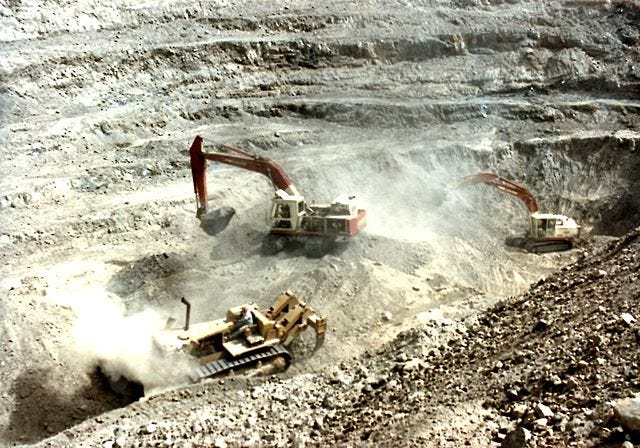How mining companies get their way
Report examines the way Canadian firms “bully foreign governments for billions”

Canadian mining companies are able to force developing countries to bend to their will through investor-state dispute settlements (ISDS), which allow private companies to sue foreign governments for interfering with their business interests, according to a new report from the Canadian Centre for Policy Alternatives (CCPA).
The report, titled On the Offensive: How Canadian companies use trade and investment agreements to bully foreign governments for billions, came out Thursday and was written by senior CCPA researcher Hadrian Mertins-Kirkwood.
While ISDS agreements have been historically common in reciprocal free trade agreements between developed countries, they have a uniquely pernicious impact in the developing world, Mertins-Kirkwood told me in an interview.
“When we sign a deal with a lot of Latin American countries or African countries or Asian countries, they're not investing in Canada. But there's a lot of Canadian investment, especially mining investment in a lot of these countries. So really, the only reason that system exists is to protect the Canadian investors in these developing countries,” he said. “That's the only way it can really be used.”
During negotiations for the United States-Mexico-Canada trade agreement, then-international trade minister Chrystia Freeland successfully pushed for the removal of ISDS provisions because of the way it gave U.S. corporations power over Canada.
But what’s unacceptable for us is business as usual in the developing world.
The countries whose laws are most frequently challenged by Canadian investors are Venezuela with seven cases; Columbia with five; Ecuador with four; and Kazakhstan with four, the report notes.
These investor disputes play a key role in shaping Canadian foreign policy, Mertins-Kirkwood noted.
The Canadian government played a leading role in the Lima Group, which was dedicated to changing the government in Venezuela. It’s no coincidence that Canada was the sole non-Latin American member of the group.
“Canada has a big economic interest in Venezuela, specifically in the Venezuelan resource industry. A lot of Canadian extractive companies operate there. And as the Venezuelan government has tried to nationalize a whole bunch of sectors, it's come at the expense of investors. Our big diplomatic interest in Venezuela is really built on a foundation of economic interests that we don't necessarily take in every country around the world,” he said.
The highest payout for a Canadian company in the Global South was in 2019. The government of Pakistan had to pay $5.84 billion US to Tethyan Copper, which is co-owned by Barrick Gold — the company founded by Munk School of Global Affairs namesake Peter Munk — for not granting the company a mining licence. While the company had only invested $220 million US in the project, an ISDS tribunal ordered Pakistan to pay the estimated amount of how much the project would generate.
“They just let the investor have their way,” explained Mertins-Kirkwood.
This lopsided trade relationship has devastating impacts for the planet, as countries shift away from fossil fuels. While wealthier countries can afford to shoulder the burden of this cost, developing countries cannot under the ISDS regime.
Canadian investors have been awarded a total of $10.2 billion from ISDS rulings and settlements, with an average $1.3-billion payout, according to the report.
“There's a lot of countries around the world that if they have to pay the big compensation worth as the cost of environmental policy, they won't do it,” Mertins-Kirkwood said.
The report calls on the Canadian government to remove ISDS from all existing trade and investment agreements and to exclude them from future deals.
In other news …
The embattled Alberta premier resigned as leader of the United Conservative Party after receiving 51.4% support in a long-awaited leadership review, despite having previously said anything over 50% was good enough for him.
From CBC News: “Kenney believed the no vote was being driven by Albertans who opposed public health restrictions enacted by his government such as masking and vaccine passports to contain the spread of COVID-19.”
The types of people lining up to replace Kenney suggest he could be correct for a change.
Brian Jean, who lost the inaugural UCP leadership race to Kenney in 2017 and won a Fort McMurray byelection earlier this year on a single-issue platform of removing Kenney from power for being a globalist, said he’s running for the leadership. As did Danielle Smith, the former Wildrose leader of opposition who last year compared mandatory vaccination to Nazi experiments on Jewish people.
Other names bandied about include Drew Barnes, who was kicked out of the UCP for his outspoken opposition to any COVID mitigation measures whatsoever, Leela Aheer, who was kicked out of cabinet for criticizing Kenney’s flouting of COVID measures, Finance Minister Travis Toews, Kenney loyalist Jason Nixon, my MLA Doug Schweitzer, and former MP Rona Ambrose.
Oh, and Kenney might run, according to this Don Braid column.
Edited by Scott Schmidt


